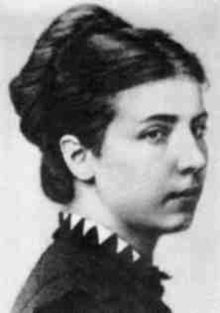
Back Elisabeth Dmitrieff Breton Elisabeth Dmitrieff Catalan Elisabeth Dmitrieff Welsh Elisabeth Dmitrieff German Elisabeth Dmitrieff Spanish Elisabeth Dmitrieff Basque Élisabeth Dmitrieff French Élisabeth Dmitrieff Italian Elisabeth Dmitrieff Occitan Дмитриева, Елизавета Лукинична Russian
Elisabeth Dmitrieff | |
|---|---|
 Elisabeth Dmitrieff photographed by Alphonse Liébert in 1871 | |
| Born | Elizaveta Lukinichna Kusheleva 1 November 1850 |
| Died | 1916–1918 (?) |
| Other names | Elizaveta Tomanovskaya |
| Occupation | Revolutionary |
| Known for | Participation in the Paris Commune |
Elisabeth Dmitrieff (born Elizaveta Lukinichna Kusheleva, Russian: Елизавета Лукинична Кушелева, also known as Elizaveta Tomanovskaya; 1 November 1850 – probably between 1916 and 1918) was a Russian revolutionary and feminist activist. The illegitimate daughter of a Russian aristocrat and a German nurse, she had a comfortable upbringing but was marginalized within the Russian aristocracy due to the circumstances of her birth, leading to her interest in Marxism and the radical ideas of Nikolay Chernyshevsky. She entered into a marriage of convenience with Mikhail Tomanovski, a colonel who had retired early due to illness, in order to access her inheritance, which she used to fund revolutionary causes such as the Russian-language journal Narodnoye delo. Her money and married status allowed her to leave Russia and study in Geneva, where she participated in founding the Geneva section of the International Workingmen's Association. Sent by the Geneva section as an envoy to London, she became close to Karl Marx and his daughter Jenny.
When the revolutionary Paris Commune was declared following the French defeat in the Franco-Prussian War, Marx sent Dmitrieff to Paris as a representative of the International. There, she became one of the most important women's leaders of the Commune, founding the Women's Union to Defend Paris and Care for the Wounded, which demanded rights for working women and organized co-operative textile workshops in the city. During "bloody week", when French government forces retook the city, Dmitrieff fought and was wounded in defense of the Commune. She and Leó Frankel, whom she had worked with during the Commune and rescued in the fighting, hid in Paris for several weeks before escaping to Geneva.
Depressed by the defeat of the Commune and the failure of other revolutionaries to come to its aid, she returned to Russia in October 1871. There, she struggled to re-enter activist politics, since the radical circles of the 1870s were less sympathetic to her feminist socialism than those of the 1860s, and because she was forced to hide her communard past due to being pursued by the French, Swiss, and Russian police. She fell in love with the manager of her aging first husband's estate, Ivan Mikhailovich Davydovski, and had two children with him after she was widowed in 1873. Davydovski would become a key defendant in a sensational mass trial, accused of being a ringleader of the "Jacks of Hearts" criminal conspiracy, and was convicted for fraud and murder. Dmitrieff married him to follow him into exile in Siberia. She passed the last years of her life in obscurity, and the date of her death is uncertain.
Although historiography of the Paris Commune has tended to focus on Louise Michel, Dmitrieff's life has inspired a number of biographies. A public square carries her name in Paris, and a museum is dedicated to her in Volok, her village of birth, where she is remembered as a heroine of the revolutionary movement.
© MMXXIII Rich X Search. We shall prevail. All rights reserved. Rich X Search